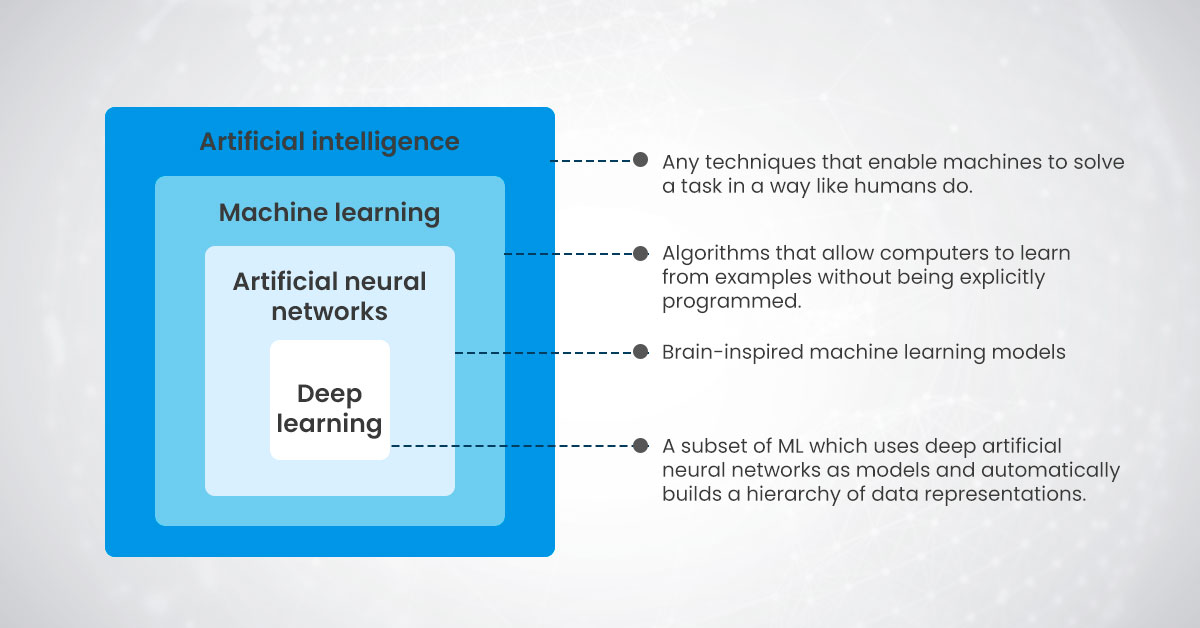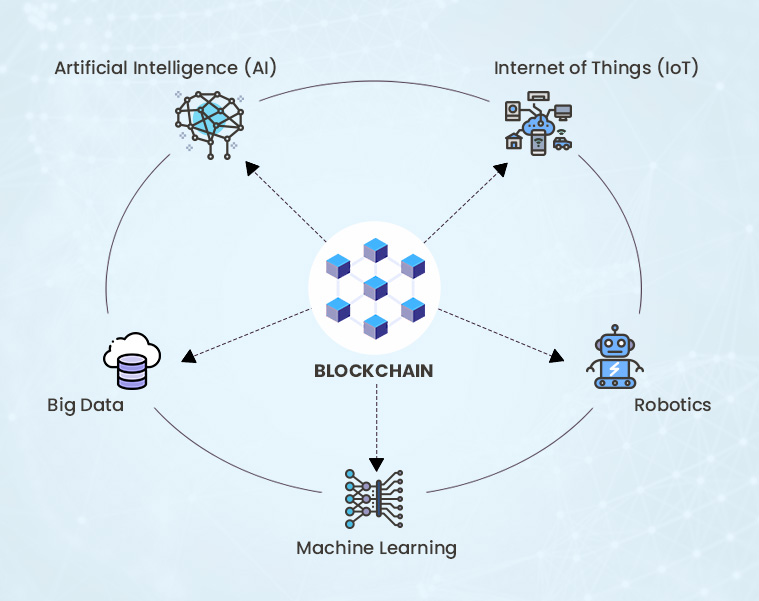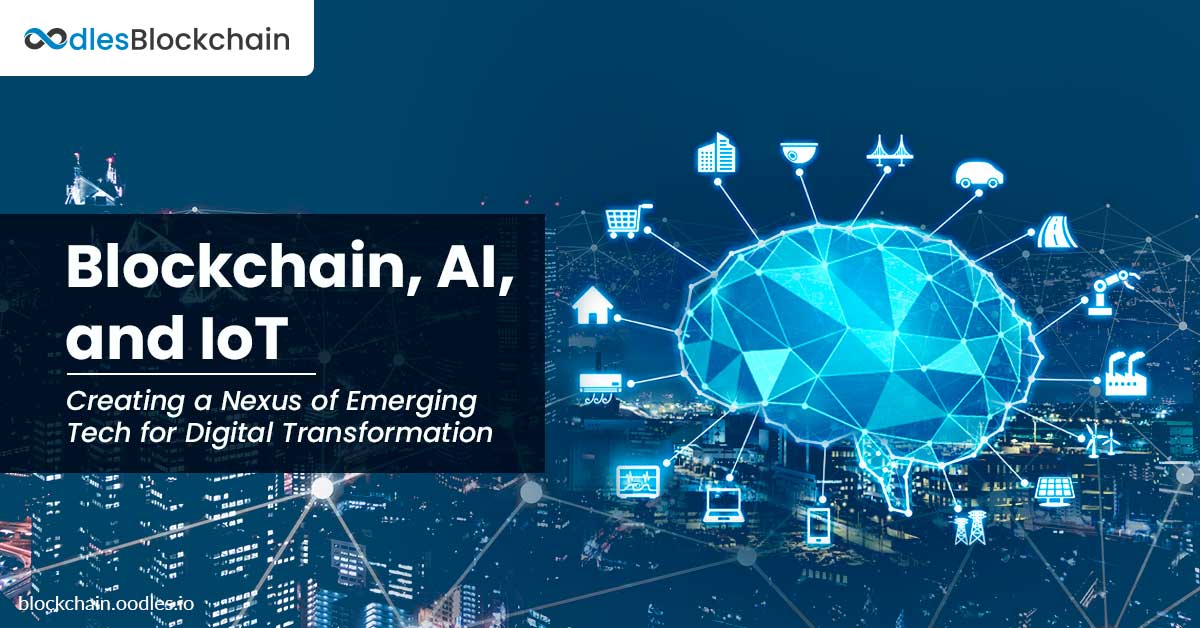-
Blockchain technology, artificial intelligence (AI), and the internet of things (IoT) are innovations with immense potential to enhance current business processes. Businesses can use custom blockchain solutions to improve trust, transparency, and privacy. They can use AI to streamline their processes by checking defects and optimizing the results of the processes. Furthermore, IoT can lead to user-friendliness and automatization of business processes. These technologies exhibit many benefits individually, but what if we combine blockchain, AI, and IoT together? Can businesses experience advancements in their pursuit of digital transformation and create new business opportunities? Let's find out in this article.
IoT | Gather Data in Real-Time
IoT devices, including smart buildings, smart home devices, smart grids, sensors, cars, or machines collect data huge data. IoT offers near-infinite opportunities for businesses to improve their operational effectiveness or even arrange proprietary data as a product.
We're just at the tip of the iceberg as AI has evaluated only a small proportion of today's world-generated data. Current IoT discussions are mostly about technology (i.e., 5G networks and connected devices).
Instead, we should be concentrating on how we can transform data into actionable insights. Here, artificial intelligence and its application come into play.
Read More about IoT | Strengthening Cold Supply Chain Management with Blockchain and IoT
AI and Machine Learning | Process and Optimize Data
Studies suggest that less than half of organizations comprehend the advantages and limitations of combining IoT and AI. Businesses need to understand AI and IoT to realize their full potential in businesses.
AI captures raw data of systems and makes sense of it. On the other hand, machine learning processes that information and infuses it at a device or sensor location with actionable insights.
Then, AI creates a flow in which IoT devices and sensors collect data. AI analyzes the data to provide insights, machine learning optimizes devices for actionable insights. IoT devices collect more nuanced data.
For instance, an IoT-enabled healthcare device that monitors the condition of an elderly patient collects relevant data. Further, AI translates it to understand that the patient might have not taken their medication in due time. Then, machine learning algorithms warn the program to send further updates, remind, or escalate the situation to a healthcare worker.
It also makes it possible to arrange a business information exchange efficiently. For example, data from the healthcare sector can benefit the insurance and sport lifestyle industries. However, it calls into question security and that's where Blockchain enters.

Check it Out | Blockchain and Artificial Intelligence: Business Applications and Challenges
Blockchain | An Immutable Memory for Transactions
Blockchain is probably the technology most overlooked of them all. A majority of businesses do not completely understand how IoT, AI, and blockchain can work together for maximizing efficiency.
Indeed, with its immutable distributed ledger, blockchain can establish and develop trust and transparency in data exchange across an ecosystem. Additionally, blockchain with smart contract solutions facilitates faster transactions and reduces overall costs by cutting the intermediaries in various business outcomes.
Returning to our previously mentioned example of healthcare, businesses can use blockchain to facilitate the secure transfer of sensitive data among care providers, including hospitals, rehabilitation centers, insurance companies, clinical trials, social workers, family members, and more.
Had blockchain been implemented, things during the 2008 Lehman Brothers crash could also have been different. But, no one had full knowledge during the crash, such as who held what assets and the magnitude of the threat. An ecosystem that features regulators as nodes could have helped track challenges.

Benefits of Combining Blockchain, AI, and IoT
The integration of blockchain, IoT, and AI will enable organizations to optimize the benefits of these technologies. The convergence will ensure the mitigation of the associated risks and limitations. Since IoT networks involve a multitude of connected devices, the network includes multiple vulnerabilities, including fraud and data theft.
AI-driven by machine learning will proactively protect itself against malware and hacker attacks to avoid security problems. Blockchain will further improve network and data protection, which can restrict unauthorized access and manipulation of network data. Additionally, AI can improve the IoT network's efficiency by making it smarter and more autonomous.
Also, Read | A Use Case for Blockchain in Thorium’s Supply Chain Traceability
A possible case demonstrating the integration of blockchain, AI, and IoT is Fujitsu's algorithm for calculating the heat stress rates of the staff.
Basically, the algorithm continuously tracks the physiological data of workers, such as temperature, humidity, levels of activity, pulse, etc. It uses IoT wearables and sensors to track the association between various variables and the health of employees.
Further, an analysis assists an organization to augment employee working practices and save them from exposure to serious work-induced health problems. Adding blockchain to this program can help keep track of more customized data by maintaining anonymity. Or it can help with smart contracts to disburse health insurance amounts.
If you are looking for the right partner for your blockchain-based project, then Oodles is the right partner. Connect with our blockchain developers to avail of our services.

Our Offices
INDIA
Emaar Digital Greens, Sector 61,
Gurugram, Haryana
122011.
Welldone Tech Park,
Sector 48, Sohna road,
Gurugram, Haryana
122018.














